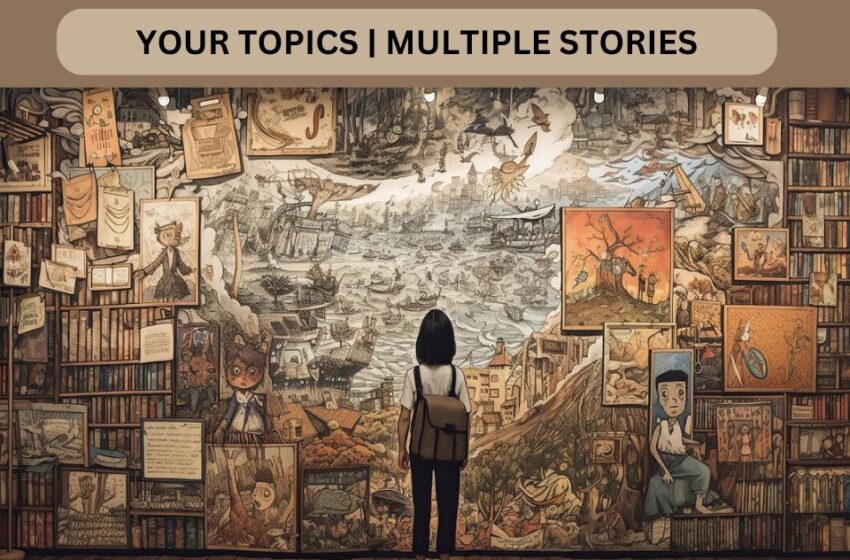Your Topics | Multiple Stories: A Comprehensive Guide

Storytelling is a timeless art form that has evolved significantly in the digital era. The concept of Your Topics | Multiple Stories highlights the versatility of narratives that explore themes from multiple angles, capturing a broader audience and creating more profound connections. This guide delves into the nuances of crafting and presenting multi-narrative content, its benefits, and actionable strategies to excel in this approach.
Essence Of Your Topics | Multiple Stories
In storytelling, a single perspective often captures only part of the picture. By integrating multiple stories under a unified theme, creators offer a richer, more dynamic narrative landscape. This strategy allows content to resonate with diverse audiences by reflecting varied experiences, ideas, or viewpoints. Whether in literature, advertising, or digital media, the multi-story format is a game-changer for engagement and impact.
Benefits Of The Multi-Story Approach
Broader Audience Appeal
Diverse narratives cater to a wide range of preferences. For instance:
- A blog about sustainability might include personal accounts from individuals, insights from businesses, and community case studies.
- A documentary can highlight different cultural responses to a single global challenge.
This variety ensures that content connects with people across demographic and interest spectrums.
Increased Emotional Depth
Multiple stories create layered emotional experiences. While one story might evoke empathy, another might inspire action. This balance amplifies the overall impact.
Enhanced Understanding
Breaking down complex subjects through varied lenses fosters comprehension. For example, presenting historical events from different perspectives (e.g., soldiers, civilians, and leaders) offers a holistic view of their significance.
How To Create Compelling Multi-Story Content
Step 1: Define Your Core Theme
A clear, overarching theme ensures consistency. Themes like resilience, innovation, or community serve as anchors, allowing each story to explore a unique facet of the topic.
Step 2: Curate Diverse Perspectives
Diversity is the backbone of multi-story formats. Include:
- Personal anecdotes
- Professional insights
- Community-driven stories
For example, a feature on mental health could incorporate narratives from therapists, patients, and advocates.
Step 3: Organize Your Content Thoughtfully
Arrange your stories in a way that ensures coherence. Possible structures include:
Chronological Order: Ideal for historical or developmental themes.
Thematic Segmentation: Group stories by subtopics for clarity.
Contrasting Perspectives: Highlight differences between narratives to provoke thought.
Step 4: Use Visuals and Multimedia
Infographics, videos, and photos enrich multi-story content. Social media platforms like Instagram or TikTok can effectively showcase short narratives.
Step 5: Edit for Consistency
While maintaining unique tones for each story, ensure that the overall voice aligns with your brand or purpose.
Examples Across Industries
Education
Multi-story approaches enhance learning. Consider a science course exploring climate change:
- A researcher’s account of fieldwork
- A policymaker’s perspective on regulations
- A community leader’s experience with adaptation
Marketing and Branding
Brands leverage multi-story formats to strengthen their messaging:
Case in Point: Nike’s campaigns showcase professional athletes and everyday fitness enthusiasts, emphasizing inclusivity and determination.
Entertainment
Anthology series like Black Mirror thrive on the multi-story format, delivering distinct yet thematically connected episodes.
Challenges In Multi-Story Content
Overloading Audiences
Excessive narratives can dilute the message. Focus on quality over quantity by selecting impactful stories.
Maintaining Coherence
Disjointed stories confuse audiences. Use transitional elements to bridge narratives seamlessly.
Balancing Depth And Brevity
While each story should stand alone, brevity ensures engagement. Supplement with summaries or visuals to add depth.
Pro Tips For Successful Multi-Story Projects
Experiment with Formats: Combine written, visual, and audio elements to maintain interest.
Engage Your Audience: Use polls, comments, or feedback to involve readers or viewers in the storytelling process.
Adapt for Mediums: Tailor your content for platforms like blogs, social media, or podcasts.
Future Of Multi-Story Content
Immersive Technologies
Virtual and augmented reality open avenues for multi-dimensional storytelling, enabling audiences to experience narratives interactively.
AI and Personalization
AI tools can create custom multi-story experiences, tailoring content to individual preferences while preserving coherence.
Community-Driven Narratives
Crowdsourced stories, as seen on platforms like Reddit, bring authenticity and inclusivity to multi-story projects.
Final Words
Your Topics | Multiple Stories showcases the transformative power of diverse narratives. This approach not only enhances engagement but also deepens understanding, creating richer experiences for audiences across platforms. Whether in education, entertainment, or branding, the potential for multi-story formats is limitless. By weaving varied tales under a unifying theme, creators can captivate, inform, and inspire in ways that single narratives cannot.
FAQs
What is the core idea of multi-story content?
Multi-story content involves presenting multiple narratives around a central theme to enhance engagement and depth.
How can I ensure my stories remain connected?
Use a consistent theme, tone, or structure, and employ transitional elements between stories for coherence.
Which platforms are ideal for multi-story formats?
Social media, blogs, podcasts, and anthology series are excellent platforms for showcasing diverse narratives.
What industries benefit most from multi-story approaches?
Education, marketing, entertainment, and journalism all benefit from the versatility of multi-story content.